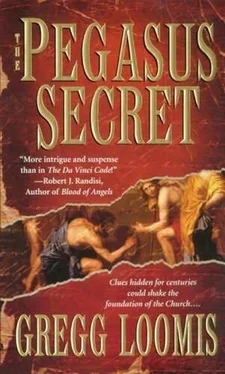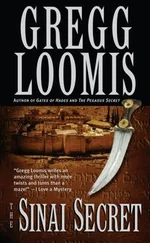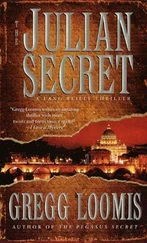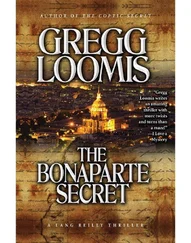"Thanks."
An hour later, Lang put down a tattered paperback Latin-English dictionary, shocked to discover he had been right. The painting was an enigma no more, although it was going to take an Olympic-quality broad jump of faith to believe its message. But Pegasus sure as hell did. That was why they were willing to kill.
Pietro's narrative and the enigmatic inscription said the same thing, as unbelievable as it might be. Now all Lang had to do was evade the cops and some very nasty people long enough to locate a specific spot among thousands of square miles and verify the tale of a monk dead seven hundred years.
He was on his way to France.
THE TEMPLARS:
THE END OF AN ORDER
An Account by Pietro of Sicily
Translation from the medieval Latin by Nigel Wolffe, Ph.D.
And so did the days fly by on the wings of falcons. Such time as I could spare from assisting the cellarer as his seneschal, doing sums on the abacus and making inventory of such produce as the Temple's serfs produced. 1Such time as I could, I stole from my labours to spend in the library, learning more about the Gnostics and their pernicious apostasy, documents so vile that at least one was secreted not in the library but in a hollow column. Its existence was revealed to only a few brothers. How I wish I had not been one of them! I was not amused by the irreverence shown the Holy Gospels as much as I was curious as to the contents of the vessel mentioned in those ancient volumes. I also was curious as to the reason the Holy See would send what amounted to tribute to a single Temple whose only duty was to guard Serres and Rennes, two simple villages which appeared to apprehend no danger.
Thus did the Gnostic documents tempt me as the serpent did Eve, induce me to seek knowledge of that better left in obscurity.
One sin begot another and I began to journey far from the Temple, my peregrinations taking me even beyond the boundaries of the Temple's fiefdom and along the River Sals and among the hills and mountains, particularly the white mountain called Cardou. I chose this path because it was the one most similar to the one described in the writings of the heretics as being the ancient Roman road and the one taken by Joseph of Arimathea and Mary Magdalene when they came into these parts. 2I compounded these derelictions of my duties to my brethren and to God by wantonly lying to my superiors, falsely testifying that I was but walking the metes and bounds of the Temple's estates. Much more the sin because I was seeking forbidden knowledge.
Directions could not be had from the villeins thereabout, for they spoke in a dialect I could not comprehend. Had they been conversant in Frankish or Latin, it is improbable they could have answered the queries that filled my head. Caked as they were with the dirt in which they lived, reeking of sweat and their own excrement, I found it difficult to remember that they, too, were children of God. Even more uncomfortable was the knowledge that I had come from stock such as these. Clean clothes, meat each day and a fresh bed at night had engendered the sin of pride which had attached itself to my soul like a lamprey upon some hapless fish.
It was from one of these journeys I was returning one day in October. The earth was still dust, for winter's rains had not yet begun. The orchards were ablaze both with ripening fruit and autumnal foliage and the vines were no more than twisted twigs, having already been harvested and pruned. A cold wind blew from the west, the breath of the new snow I could see on those mountains known as Pyrenees at which the Languedoc ends and the Iberian country of Catalonia begins. I wondered at that time why the knights did not free the lands on the other side of those mountains from the heathen. 3
On the slope of the mountain called Cardou, I paused for a moment to give thanks to God for a spectacle so rich and to wonder at the majesty that created it in six days' time. I had barely said my "Amen" when a hare, large and fat no doubt from a summer of repasts at the expense of the Brothers' gardens, ran nearly over my feet. It stopped a short distance upwards and away and looked at me with an insolent eye.
The animal robbed me of all thoughts of Him who made us both. Instead, I remembered the summer months which had passed without the spicy flesh I saw before me. I raised my staff and moved forward with caution.
My second step did not stop with what I thought to be firmament beneath wild berry bushes. Instead, I had stepped into a void to the extent that I fell forward. When I stood, reaching for the staff I had dropped, I observed that the bushes obscured an opening in the earth much larger than that into which I had stumbled.
I was facing no mere animal burrow but a cave or shaft in the stone white as the distant snow, a hole so cleverly concealed that, had I not fallen, I would have walked past without notice. Without moving from where I stood, the marks of stonecutters were visible upon the walls. This was, then, no natural crevice or fault in the mountain but one brought about by the hand of man.
Had I but turned and sought explanation of my discovery, I would go to the fate that awaits me in peace. As it is, Satan himself fueled the curiosity that led me forward.
From the light outside, I could see I was in a chamber, a cave, perhaps, crudely enlarged. Darkness prohibited my taking its exact measure, but I could stand upright and my extended arms touched neither side nor ceiling.
In the dimness, I perceived an object in the middle of the rough floor, a block of stone of about the size of a bound manuscript. 4On this stone were carvings, letters I scarcely could make out which appeared to be of Hebrew characters, perhaps Aramaic, and Latin. I let my fingers explore since there was insufficient light to see clearly.
Could this be the vessel spoken of in the Gnostic heresies? The stone was of a texture like the white of the Languedoc, so it likely had been carved where I found it, 5a more believable occurrence than transporting such a heavy object from the Holy Land. Without reading the inscriptions, I would not know and I was filled with a lust for that knowledge no less carnal than that which drives a man to seek a harlot.
I needed light by which I could probe the mystery of what I had found. The Temple was but a quarter of an hour away and could be seen from the mouth of the cavern. The light of a single taper would assuage a hunger for knowledge more acute than any my belly had ever felt for victuals.
I ran as though hell itself were behind me, as indeed it turned out to be. I dashed through the portcullis, hardly extending a greeting to those who guarded. the entrance. I crossed the cloister at a run that drew the attention of all and did not care of the opprobrium such conduct would bring. 6Such was my haste that I neglected to cleave to the walls of the arcade surrounding the garth, thereby demonstrating my humility by surrendering the wider path. Instead, I dashed along the middle, caring not which of my brethren were forced to give way. Inside, I suppressed the instinct to snatch the first lighted candle I saw from its sconce. Instead, I found one in my own cell and I stopped in the chapel to light it from those that eternally burn there. In such a haste was I, I nearly neglected to genuflect upon my departure.
My return to the cave was at a more sedate pace than my departure, for, should an errant breeze or a sudden move extinguish the candle, I would have to return to the Temple to light it anew.
Inside the cavern, I knelt beside the stone. edifice and shielded my candle. The Latin inscription was of a dialect so archaic I found it difficult to decipher. The stone into which it was carved badly crumbled.
As I contemplated what was written, it was as if the cold hand of Satan squeezed my heart and I swooned into darkness. I know not how long I was oblivious to the physical world but when I awoke, I wished I had not. According to the label carved thereon, this stone contained that which even now I dare not mention. The fire to which I will shortly be consigned will not be hot enough to expurgate my soul of the perdition engraved upon that stone.
Читать дальше












